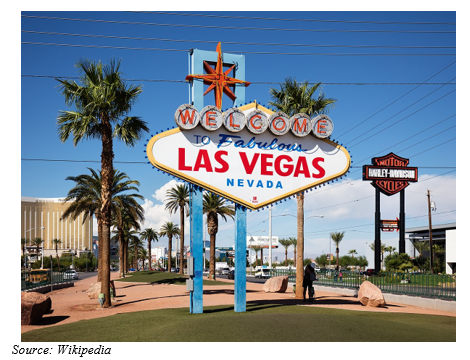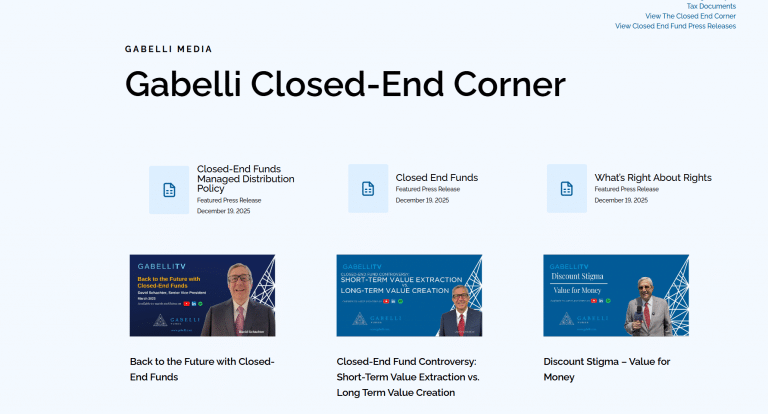LAS VEGAS LAND BASED GAMING OVERVIEW
Las Vegas has continuously evolved from its humble beginnings as a desert stopover for GIs heading to the West Coast to becoming one of the world’s most iconic tourist destinations and epicenter of the global gaming and entertainment industry.
In the 1960s, the Las Vegas Strip began to take shape with the construction of grand hotels and casinos like Caesars Palace (1966) and The International (1969), setting the stage for the City’s future as a world-renowned playground for nightlife, gaming, and extravagant experiences. By the 1980s, its blend of extensive hotel capacity, entertainment, and accessibility made it an ideal location for large-scale conferences and trade shows. The 1990s marked an attempt to broaden its appeal by introducing family-friendly resorts like Excalibur (1990) and Luxor (1993). However, by the 2000s, the city shifted back toward luxury and adult-focused experiences with the development of high-end properties such as Aria (2009) and The Cosmopolitan (2010), emphasizing celebrity chefs and nightlife.
Over the years Las Vegas has transformed from a majority of revenues being derived from gaming in casinos, to becoming a center for dining, shopping, and entertainment. Exhibit 1 below illustrates the combined revenues for all casino licenses on the Las Vegas Strip from 1990 to 2023, broken down by gaming and non-gaming sources. In 2023 the combined revenues represented 50 licensees and more than 70% of revenues came from non-gaming sources.
Today, Las Vegas is one of the fastest-growing cities in America and continues to reinvent itself, emerging as a major sports hub with the arrival of professional teams like the Golden Knights (NHL), Raiders (NFL), and soon the Athletics (MLB), while also a key destination for fighting sports and now a fixture on the Formula 1 calendar.

We believe Las Vegas Strip GGR will grow approximately in line with US GDP forecasts over the next five years, with the Las Vegas Locals market growing at a faster pace due to an increasing local population. According to the UNLV Center for Business and Economic Research, Clark County’s population is forecasted to grow at an annual rate of 1.7% from 2023 to 2028 vs an estimated national growth rate of 0.6% according to the Congressional Budget Office.

While we see gaming revenues only growing at a low single digit pace, on the arguably more important non-gaming side, we estimate rooms revenue in Las Vegas will outpace national growth rates as attractive new entertainment demand generators like the Sphere continue to draw visitation to the city. We see this moderating over time but continuing to outpace gaming revenue growth. Food & beverage revenues have historically grown consistently in the mid-single digits range which we think will persist as casino resorts continue to emphasize celebrity chefs and dining experiences. Overall, Las Vegas continues to look like an attractive investment opportunity.

LET’S TALK STOCKS – LAND BASED
Bally’s Corp. (BALY-$17.30-NYSE), headquartered in Providence, Rhode Island, owns and manages 16 casinos across 10 states, as well as the Bally’s Golf Link at Ferry Point and the Arapahoe Park Horse Track in Colorado. Bally’s offers online sports betting and iGaming in the US through BallyBet and internationally through its Gamesys brands. The Bally’s of today is the result of a buy-and-build strategy accelerated by its largest shareholder Standard General L.P. with the reverse merger of Twin River Worldwide Holdings and Dover Downs Gaming & Entertainment in 2019. In September 2022, Bally’s acquired the non-land assets of the Rat Pack-era Tropicana Las Vegas from GLPI and Penn Entertainment. On October 9th, at 2:30am, the Tropicana will be imploded in a grand spectacle of fireworks and a drone show to make way for a new resort, which will also incorporate a baseball stadium for the Oakland Athletics to use starting in the 2028-29 season. Despite steady performance at its regional casinos and attractive growth projects in its pipeline such as the Tropicana redevelopment, proposal for a new New York gaming license, and its flagship downtown Chicago casino opening in 2026, tepid results from its online businesses and high leverage have weighed negatively on the stock as it traded from a high of $71.58 in March 2021 to a low of $8.65 in October 2023. In July 2024, Bally’s agreed to be acquired by Standard General for $18.25 cash per share, valuing the transaction at approximately $4.6 billion. The deal is subject to shareholder, as well as regulatory, approvals and is expected to close in the first half of 2025.
Boyd Gaming (BYD-$63.90-NYSE), headquartered in Las Vegas NV, operates 28 casinos across 10 states. 11 of their properties are located in Nevada across the Las Vegas Locals and Downtown Las Vegas markets. In November of 2022, Boyd acquired Pala Interactive, a B2B and B2C online gaming technology company. Boyd’s Interactive division offers both real money online casino games as well as social casinos through the branded app Stardust. The Company also owns a 5% stake in FanDuel and provides market access agreements through their land-based properties. Boyd owns the majority of their real estate and has relatively low leverage which provides significant optionality. Boyd employs a balanced capital allocation policy reinvesting into their portfolio while also returning capital to shareholders. A recent example of their portfolio reinvestment, Boyd reopened Treasure Chest in Louisiana as a land-based facility in June, replacing the original riverboat casino. Early results have demonstrated strong demand for the property and improved economics. They also recently announced a new development project to build a casino in Henderson NV named Cadence Crossing. The company has also been returning capital to shareholders in the form of share repurchases and a regular dividend.
Caesars Entertainment (CZR-$40.80-NASDAQ), headquartered in Reno NV, operates 51 casinos across 16 states, online sports betting in 20 jurisdictions and iCasino in six jurisdictions, under a portfolio of brands including Harrah’s, Horseshoe, Caesars, Isle of Capri, and Eldorado. Caesars operates nine destination properties on the Las Vegas Strip: Caesars Palace, Harrah’s Las Vegas, the Rio, Planet Hollywood, Paris Las Vegas, the LINQ, Horseshoe Las Vegas, the Flamingo, and the Cromwell. The current incarnation of the company was created through an acquisition by Eldorado Resorts which closed shortly after the global pandemic struck in early 2020. The company has been on a multi-year journey to deleverage through free cash flow, a slow but steady process which has weighed on the share price. The combination of an interest rate cutting cycle and the company coming to the end of a capital investment cycle should help to accelerate deleveraging as free cash flow increases. Caesars Digital business, while not one of the podium operators, has the potential to be a nice profit generator for the company longer term. Caesars is one of the many bidders for a downstate casino license in New York City, having partnered with SL Green and Jay-Z’s Roc Nation on a resort in Times Square.
Golden Entertainment (GDEN-$31.13-NASDAQ), headquartered in Las Vegas, NV, operates a portfolio of eight casinos as well as a chain of 65 taverns in the Las Vegas valley under the brand PT’s Taverns. Their casino portfolio consists of the STRAT, a destination property located on the far north end of the Las Vegas Strip, and regional resorts in Laughlin, NV: the Aquarius, Edgewater, and Colorado Belle. Their portfolio of locals casinos include two Arizona Charlie’s in Las Vegas and several properties in Pahrump, NV, about 60 miles west of Las Vegas. GDEN has recently been divesting assets at accretive valuations. The company sold the real estate and operations for Rocky Gap Maryland in July of 2023, and more recently divested their distributed slots business in Montana and Nevada. Moving forward, GDEN is a pure play Nevada gaming operator and can put greater focus on expanding their local taverns business in the Las Vegas Valley, capturing favorable demographic tailwinds. GDEN now has one of the lowest leveraged balance sheets in the industry and has begun returning capital to shareholders in the form of share repurchases and paying a regular dividend.
Full House Resorts (FLL-$4.87-NASDAQ), headquartered in Las Vegas, NV, operates seven casinos across the five states of Colorado, Illinois, Indiana, Mississippi, and Nevada. Over the last few years, FLL has successfully developed two new properties that represent significantly larger earnings potential relative to the legacy properties. The Temporary at American Place in Waukegan, IL, opened in February 2023, has already doubled the operating earnings of the company. The most recent development, Chamonix in Cripple Creek, CO, which opened in December of 2023, has been slower to scale its operations. The casino is located in a historically smaller market and aims to expand the overall gaming penetration, drawing from nearby Colorado Springs. While Chamonix may take years to scale and its ultimate potential remains unclear, it could represent significant growth over the long term. Looking forward, FLL will develop the permanent casino American Place in Waukegan over the next few years which will continue to provide the company with an attractive growth pipeline.
MGM Resorts (MGM-$38.62-NYSE), headquartered in Las Vegas, NV, operates nine Las Vegas Strip resorts and seven regional properties. Their Strip portfolio consists of the Aria, Bellagio, Cosmopolitan, MGM Grand, Mandalay Bay, Luxor, Excalibur, New York-New York, and the Park MGM. Additionally, MGM through its controlling interest in MGM China, owns two integrated resorts in Macau. The company also has a 50/50 JV in BetMGM, a top operator in online sports betting and iGaming. In 2022, MGM acquired LeoVegas, an iGaming and online sports betting operator in eight jurisdictions in the Nordics and Europe. The company currently operates the BetMGM brand as a fully owned subsidiary outside of the US and Canada. MGM is also bidding on a downstate casino license in New York, which would allow the conversion of the already operating Empire City Casino at Yonkers Raceway from a limited-license to a full-fledged casino resort.
PENN Entertainment (PENN-$18.47-NASDAQ), headquartered in Wyomissing, Pennsylvania, operates 43 casino properties in 20 US states, online sports betting in 18 jurisdictions and iCasino in five jurisdictions, under a portfolio of brands including Hollywood Casino, L’Auberge, theScore Bet Sportsbook and Casino, and ESPN BET. In August 2023, after terminating their relationship with the Barstool Sports network, PENN entered into an exclusive long-term strategic alliance with ESPN, replacing their Barstool Sportsbook app with ESPN BET. PENN’s retail business has remained stable, but whether ESPN BET can effectively leverage the vast reach of its namesake media network to capture a meaningful share of the sports betting market remains to be seen. Management will host an Analyst Meeting at their M Resort Las Vegas property October 7th where we expect questions will focus on key performance indicators for ESPN BET and actions to address recent activist investor criticisms over its strategic direction, capital allocation, and leadership.
Red Rock Resorts (RRR-$54.12-NASDAQ), headquartered in Las Vegas NV, through its equity interest in Station Casinos, operates 17 casinos in the Las Vegas Locals market. The most significant properties include the eponymous Red Rock Resort, Palace Station, Green Valley Ranch, and Sunset Station. In December of last year, RRR opened its newest property Durango. The company strategically locates casinos in high-growth and high-income residential areas of the Las Vegas Valley and offers locals a world-class integrated resort experience without the hassle of traveling to the Strip. Durango’s launch was extremely successful, and RRR is already planning additional capital investment to expand the property. RRR has an embedded growth pipeline, owning a total of 441 acres in the Las Vegas Valley, of which 354 acres are in areas with attractive demographics that the company plans to use for future development.
Wynn Resorts (WYNN-$99.45-NASDAQ), headquartered in Las Vegas, NV, operates the Wynn Resort and Encore on the Las Vegas Strip, as well as Encore Boston Harbor. Through its controlling interest in Wynn Macau, the company owns two integrated resorts in Macau. Wynn is currently in the development stage of a new integrated resort in Ras Al Khaimah, UAE, called the Wynn Al Marjan. On October 8th, Wynn will host an investor meeting where they will provide updates on the new development. Wynn is also currently bidding on one of the potential New York Downstate gaming licenses. They have partnered with Related on a bid to develop a casino resort as part of a $12 billion project in Hudson Yards which would also include a residential and mixed-use building as well as a 5.6 acre park.
BETTING ON DIGITAL: ONLINE GAMING MARKETS OVERVIEW
Globally, one of the earliest and most significant online gambling regulations was the United Kingdom’s introduction of the Remote Gambling and Software Technical Standards in 2001, which established a licensing framework and set a precedent for the industry. Its long regulated history has resulted in the £10.9 billion ($14.6 bn) UK gaming market (excluding lotteries) becoming one of the most mature online markets globally, with approximately 60% of gaming activity taking place online. The majority of Europe now regulates online betting and gaming, and legislative actions globally continue to open new opportunities for the industry. While global land-based gaming GGR is projected to grow at low to mid-single-digit rates over the next five years, the online channel is anticipated to expand at 10%+ per annum, driven by growth in the Americas.

In the United States, it was the repeal of the Professional and Amateur Sports Participation Act in 2018 which allowed individual states to legalize and regulate sports betting. Today, 38 US states and the District of Columbia have legalized sports betting in some form, 30 of which allow online play. In parallel, six states have legalized online casinos: Connecticut, Delaware, Michigan, New Jersey, Pennsylvania, and West Virginia. In the first half of 2024 US Sports Betting GGR and iGaming GGR have totaled $6.7 bn and $3.9 bn respectively, on pace for our full year estimates of $12.8 bn and $7.1 bn. Based on the existing legislative landscape, we forecast US sports betting and iGaming GGR to exceed $20.0 bn and $11.0bn by 2028 as the market matures.

We believe the burgeoning US sports betting market, supported by the world’s wealthiest economy and a passionate professional sports fanbase, alongside the broader secular expansion of online gaming internationally, will continue to offer compelling investment opportunities within the global ecosystem of gaming operators, suppliers, technology providers and other stakeholders.
LET’S TALK STOCKS – DIGITAL
Entain plc (ENT-£7.66-LSE), headquartered in London, England, is a leading global online-led sports-betting and gaming operator. Following its acquisition of the Ladbrokes Coral Group in 2018, it operates c4,400 betting shops across the United Kingdom, Italy, Belgium, Ireland, and Croatia. Entain’s sports betting brands include bwin, Coral, Crystalbet, Eurobet, Ladbrokes, Neds, SuperSport, and Sportingbet; its gaming brands include CasinoClub, Foxy Bingo, Gala, Gioco Digitale, partypoker and PartyCasino. Entain’s US operations are led through a 50/50 joint venture with MGM Resorts International and the #3 national operator BetMGM. We see positive catalysts ahead for Entain in the execution of its strategic reset and appointment of new CEO Gavin Isaacs. Taking a step back from vigorously bolting on acquisitions over the past two years, Entain now plans to streamline its portfolio, exiting smaller markets such as Chile, Peru, Zambia and Kenya; it will refocus itself on the UK (Entain’s largest market) and Brazil (its fastest growing), while continuing to support BetMGM in the US. BetMGM offers a unique advantage in Nevada with its single account, single wallet feature which leverages MGM’s iconic Las Vegas Strip properties to provide customers with an omni-channel betting experience that seamlessly integrates their online and retail wagering.
Flutter Entertainment plc (FLUT-$235.91-NYSE), based in Dublin, Ireland, is the world’s largest online-led sports betting and gaming operator. Following its merger with The Stars Group in May 2020, the Company operates across four segments: i) UK & Ireland, which includes online and retail (600+ betting shops) operations under the Paddy Power, Betfair, Tombola, and Sky Betting & Gaming brands; ii) International includes online betting, gaming, and poker offerings under the PokerStars (ex US), Adjarbet, Betfair (ex UK&I), Sisal, and Junglee brands; iii) Australia, consisting of Sportsbet, the market leader in the Australian online betting market, and; iv) the US, consisting of the FanDuel, TVG, and PokerStars brands which offer real money and free-to-play online betting, gaming, and daily fantasy sports products. Since the overturn of PASPA in 2018, Flutter’s FanDuel brand has established itself as the dominant market leader in US sports betting. It has defended its position in an intensely competitive market through product leadership, a superior customer experience, and disciplined promotional and marketing spend. Flutter’s proprietary pricing and risk management systems have driven product innovations around higher-odd parlay bet offerings which support structurally higher win margins. Building on six years of player acquisition investment, FanDuel’s player base is now large enough to offset the ongoing costs of future customer acquisitions, enabling profitability to accelerate and strong cash flow generation, which will provide optionality for M&A opportunities and returns to shareholders.
Gambling.com Group Ltd (GAMB-$10.02-NASDAQ), headquartered in in Saint Helier, Jersey, is an affiliate marketing company and provider of digital marketing services active in the online gaming industry. The company utilizes its proprietary technology platform, branded websites, and media partnerships to attract online gaming customers and refer them to licensed online gaming operators, who then convert these leads into actual paying players. It owns and operates over 50 websites in seven languages and 15 national markets, primarily across North America and Europe, covering all aspects of the online gambling industry, including online casino, sports betting, and fantasy sports. Benefiting from its diverse portfolio of high-traffic affiliate websites and media partnerships with McClatchy Co, Gannett, and the Independent (UK), we believe Gambling.com Group is well-positioned for significant growth as the online gaming market expands.
Genius Sports Ltd (GENI-$7.44-NYSE), headquartered in London, England, is provider of data services and technology products to the sports, sports betting and sports media industries. Genius provides live sports data, oddsmaking, risk management and player marketing services to nearly all regulated sportsbook operators. It partners with sports broadcasters to supply alternative broadcast feeds, integrating optical tracking data and graphic overlays in real-time to augment live footage with statistical insights and visual content such as betting odds. Genius also works alongside leagues to protect the integrity of their competitions from the threat of match-fixing through global bet monitoring technology, online and offline education services, and consultancy services including integrity audits and investigations. Lastly, it provides a range of online marketing and fan engagement tools that drive customer acquisition and retention. Genius is the exclusive worldwide distributor of official NFL data to the global regulated sports betting market. Leveraging its scalable technology and data platforms, the Company anticipates that operating leverage will drive significant margin expansion and generate positive cash flow as global demand for sports betting continues to rise.
International Game Technology plc(IGT-$20.98-NYSE), is headquartered in London, England with principal operating facilities in Providence, Rhode Island; Las Vegas, Nevada; and Rome, Italy. IGT offers a comprehensive B2B portfolio of gaming technology products and services, including: lottery management services, instant lottery systems, gaming systems, instant ticket printing, electronic gaming machines, sports betting and iGaming content. IGT is market leader in the North American lottery market, supplying 37 of the 48 US lotteries and processing ~75% of sales. In June 2023, IGT announced a strategic review of its Gaming and Digital segments in order to address investors frustration with a stock price that had, despite good and improving business operations, continued to trade at a deep discount to its sum-of-parts. While we believe the plan to unlock value through the sale of G&D will be beneficial, investor attention may continue to center on the uncertainty surrounding its Italian Lotto concession renewal until a final decision is made. IGT have been managing the Italian lottery for 30+ years and built a deep knowledge of the market, players, and regulatory environment. Given their experience and success as the incumbent, we believe they are favorably positioned to renew the license when the competitive tender process is launched later this year.
Light & Wonder, Inc. (LNW-$87.91-NASDAQ), headquartered in Las Vegas, Nevada, and formerly known as Scientific Games, is a leading provider of slot machines, gaming content, casino management systems, and table game products and services to licensed gaming operators. Through its SciPlay division, it also offers social casino and mobile games to retail customers. In 2022, the company completed the sales of its former Lottery and Sports Betting divisions, transforming itself into a more focused cross-platform games content provider and significantly reducing its debt. In September 2024, a Nevada court temporarily banned Light & Wonder’s Dragon Train slots game due to copyright infringement allegations put forth by Australian competitor Aristocrat Technologies. Despite the ongoing legal challenge, the company reaffirmed its 2025 target of $1.4 billion in AEBITDA, highlighting its diverse portfolio of successful game franchises and noting that Dragon Train would have contributed less than 5% to this figure.
Gabelli Funds is proud to announce our participation as an exhibitor at the Global Gaming Expo (G2E), taking place from October 7-10 at The Venetian Expo, Las Vegas. G2E is the premier gathering for the gaming industry, where the latest innovations—from cutting-edge technology to groundbreaking gaming products—are unveiled to the world.
Investment Team members Gustavo Pifano and Justin McAuliffe, along with colleagues, will be attending the show, and we warmly invite those interested to reach out and connect with us during the event at Booth 5447. Gabelli Funds has been an active investor in the gaming and lodging sector for over forty years. We anticipate continued opportunities for attractive investments within the sector, as the pace of evolution has accelerated with the industry’s digital transformation and regulatory developments across North America, EMEA, and Latin America. This White Paper will present an update on some of the gaming industry’s key markets and brief overviews of the companies we expect to see in Las Vegas over the course of G2E.
MEET THE TEAM
Justin McAuliffe is a Research Analyst specializing in consumer goods and services, with a focus on gaming, lodging, and food retail. He joined the firm in 2021, previously serving as Program-Related Investment Officer at the Conrad N. Hilton Foundation. Justin is a graduate of the Cornell School of Hotel Administration and has an MBA from the Marshall School of Business at USC.
Gustavo Pifano is an Assistant Vice President and Co-Portfolio Manager of the Gabelli Equity Trust (GAB), the Gabelli Dividend & Income Trust (GDV), and the Gabelli International Small Cap Fund (GABOX). His research coverage spans global industrial and consumer discretionary companies, with a focus on gaming operators and suppliers. He is based in London and joined the firm in 2008. Gustavo holds a BBA in finance from University of Miami and an MBA from University of Oxford Said Business School.











